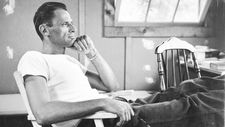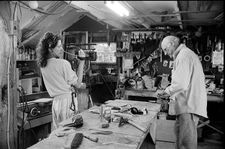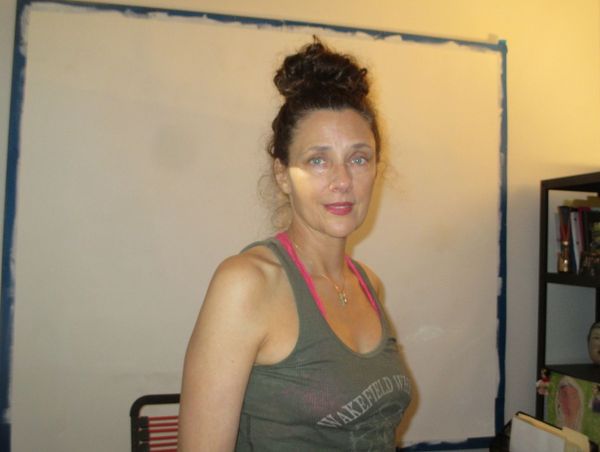"I can't think in abstract terms too much," Arthur Miller says while working on a piece of wood in Rebecca Miller's very personal, marvelously alive and warm and informative documentary that emerged from the discrepancy she sensed between the father she knew and the public persona.
Marilyn Monroe's great attraction, Arthur Miller recalls, was "her honesty," that she was "utterly without guile." Here the flame is her fame. Photos and clips from behind the scenes of The Misfits show an exhausted John Huston and we hear Clark Gable say the same lines to Marilyn that Arthur Miller had said to her in real life. She is the saddest girl they ever met.
It is fascinating to hear the Pulitzer Prize-winning playwright recount the audience's reactions to Death Of A Salesman. No applause at the first performance. Silence. People weeping. Until someone started applauding and then "there was no end to it." He continues "Fathers cried all night. They felt nailed - 'It's me!'"
Arthur Miller: Writer is a film in six chapters, bursting with love and wisdom, a highlight of the New York Film Festival where it will have its World Premiere in the Spotlight on Documentary program.
 |
| "Sometimes. He would sing in a kind of joking way. Often as a sort of like part of his humor was singing." |
Rebecca Miller: I like your bag. I am always looking for a big bag - the perfect bag to carry my computer.
Anne-Katrin Titze: It's endless, the search for the perfect bag.
RM: It's always like - the perfect bag, you have it and then suddenly it's elusive again.
AKT: Very true. Actually, many years ago we had a conversation about shoes.
RM: You and me?
AKT: Yes. We were at an opening at Leica Gallery of your mother's [Inge Morath] photographs in 2003 or 2004. You were there with your father and you were wearing blue Prada shoes. They looked like dancers' shoes, something Ruby Keeler could have worn. And you told me how much you loved these shoes. I've never seen them on anyone else. And I really wanted them.
RM: I probably still have them. I tend to keep my clothes for a really long time. Especially nice clothes.
AKT: I remember looking for them - but they were elusive.
RM: Elusive shoes.
AKT: I was thinking while watching your film, what a great gift you are giving us. It seems that so much of the footage was a gift your father gave to you. Wisdom. Trying to teach you something about the world. As a gift to you. And the act of giving some of that to us …
RM: That's a beautiful way of putting it. It's absolutely true. In a way that's really the essence of the film. There was room to make so many different kinds of film out of the footage that I had but in a sense, I tried to get out of the way of that gift.
That was my main occupation, was trying to get out of the way of somehow diluting it or obstructing it with too much of my own opinion. I just wanted him to be … the conduit to be open. And at the same time to give a sense of the life and the logic of the life because without that there was no context then.
_225.jpg) |
| Arthur Miller: Writer has its world premiere at the 55th New York Film Festival Photo: Anne-Katrin Titze |
AKT: It's remarkable how you structured it. I was thinking how difficult it must have been for you to pick and choose and not interfere too much.
RM: I think that was the thing, to find a structure that was the clearest possible. I knew from early on that I wanted to structure it in terms of the major relationships - including the parents. The mother, the father and each of the big relationships, because the wives had so much to do with the eras, you know. Then around all that came, snaked, the century. You can't tell his story without a little bit telling the story of the century. That's how I was able to think of the pillars.
AKT: So, in a way, three strands: The century, the family history, and the personal wisdoms?
RM: The basic motivation behind the whole thing was, well, if I don't record him, as I'm able to - because I was very close to him - no one will ever know what he was like. Because on film he was always quite formal and rather stiff a lot of the time. You never had his looseness and how funny he was. That was my first idea - that I just record it.
Then I started thinking, well, I want some interviews that are a little bit about the work and to try and get as deep, as far, inside the process as you can. Finally you can't penetrate the final chamber because even the artist doesn't know what they did.
AKT: Tony Kushner adds some great things on that.
RM: Tony's fantastic. Of course, later on, when I came back to it, I started to ask, you know, Tony Kushner and like Mike Nichols and a few other people whom I didn't end up including only because I felt I had what I need. I needed just enough to get perspective. I felt if Arthur said something, I let him say it, rather than an expert. Why not? It's a movie about him. It's more fun to watch.
 |
| Rebecca Miller filming her father Arthur Miller in his Connecticut wood shop Photo: Inge Morath |
AKT: Absolutely.
RM: I wanted to give the feeling like at the end that you had spent a few days with him.
AKT: Did he sing a lot? Was "I'm going to sit right down and write myself a letter" a favourite?
RM: He did! I don't know, probably yeah. He used to sing a lot. He was quite musical in his own way. He played the piano a little bit and he sang.
AKT: Did he sing while doing his woodwork?
RM: Sometimes. He would sing in a kind of joking way. Often as a sort of like part of his humour was singing.
The full conversation with Rebecca Miller will run upon the release of Arthur Miller: Writer by HBO in March of 2018.
Public screenings: Monday, October 9 at 6:30pm - Walter Reade Theater; Tuesday, October 10 at 8:30pm - Walter Reade Theater; Saturday, October 14 at 3:30pm - Walter Reade Theater - Expected to attend: ?Rebecca Miller?
The 2017 New York Film Festival runs through October 15.






















